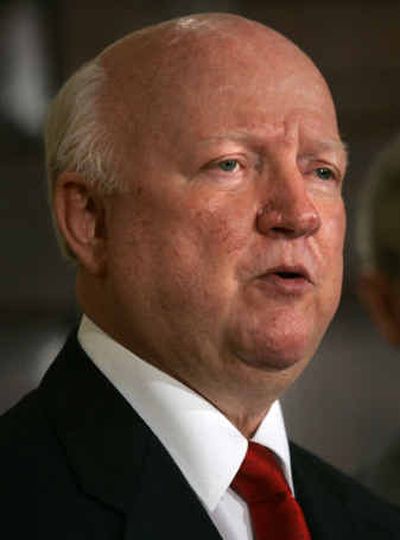Bush taps former MIT prof for Energy post

WASHINGTON – President Bush on Friday nominated Sam Bodman, a former Massachusetts Institute of Technology chemistry professor and business executive who has held senior positions in the Commerce and Treasury departments, to become the United States’ next secretary of energy.
Bodman, who has been serving as second-in-command at the Treasury Department, is considered a seasoned government administrator with unusually deep knowledge of the technical and economic aspects of energy issues.
But he will face daunting challenges at his new post, including a renewed push for Bush’s controversial national energy plan, looming decisions on nuclear waste disposal, and possible political challenges from within the administration.
Moreover, at a time of volatile oil prices, a declining dollar and rising federal deficits, energy is a highly charged element of overall economic policy.
“It will be part of fixing the U.S. economic problem,” said Philip K. Verleger Jr., a senior fellow at the Institute for International Economics and a former Treasury official. “We have a weak dollar. We have a zero savings rate. There is a real risk of an economic meltdown. With a weaker dollar, oil prices could go way up.”
Verleger praised Bodman’s knowledge of the issues, saying, “For once we’ll have a secretary of energy who actually knows a good deal about the subject and will be pretty well plugged in.”
In making the appointment, Bush vowed to renew his campaign to reduce U.S. dependence on foreign energy supplies and urged Congress to enact his national energy plan, which has been stalled because it would open parts of the Arctic National Wildlife Refuge to oil and gas exploration.
“I am optimistic about the task ahead, and I know Sam Bodman is the right man to lead this important and vital agency,” the president said during a brief White House ceremony.
Independent analysts said one of the biggest challenges facing Bodman will be making his presence felt in an administration in which energy policy has been largely dictated by two veteran oilmen: Bush and Vice President Dick Cheney.
“There’s a feeling in the industry that no matter who is at Energy, the really important decisions are made in the vice president’s office,” said Rick Mueller, senior oil analyst at ESAI, a Boston-based consulting business. “Cheney definitely has hands-on experience in the oil patch and perceives himself as the administration’s energy guy.”
If confirmed by the Senate, Bodman will take the helm at the Energy Department at a time of turmoil in global oil markets. Prices rose to record levels earlier this year as producers strained to keep up with rising demand and traders tacked on a “fear premium” to reflect the potential threat to oil supplies posed by the Iraq war, the risk of terrorist attacks and other possible disruptions.
“He’s got to be able to deal with rising prices, rising dependence on energy exports and the whole issue of energy security,” said Anthony Cordesman, an energy specialist at the Center for Strategic and International Studies in Washington. “In the real world, energy is an international issue.”
Bodman would also take over a department that is responsible for securing the nation’s nuclear facilities, encouraging conservation, reducing the risk of nuclear proliferation around the world, upgrading the country’s energy infrastructure and developing a viable hydrogen-powered automobile.
Bodman also may become the administration’s point man in lobbying Congress on the Bush energy blueprint – a task that would test his political skills. On many aspects of energy policy, lawmakers are divided not only along the usual party lines, but on regional lines as well.